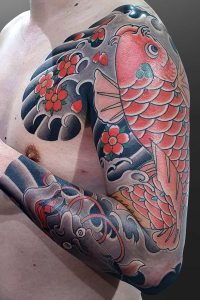When considering a Japanese tattoo, selecting the best tattoo artists is crucial to ensure that your body art reflects the rich cultural heritage and intricate artistry of this style. In Australia, a thriving community of tattoo artists specializes in Japanese designs, but not all artists are equally skilled. This article aims to guide you through the process of finding the best Japanese tattoo artist in Australia by discussing the essential aspects of Japanese tattoos, the importance of choosing the right artist, and the criteria for selection.
Understanding the Art of Japanese Tattoos
Japanese tattoos, known as “Irezumi,” hold deep cultural and historical significance. They are often characterized by vibrant colors, bold outlines, and intricate designs that tell a story or convey important symbolism. Understanding the origins and meaning behind these tattoos can greatly enhance your appreciation of the art form. Authentic tattooing in this style showcases a diverse range of traditional and contemporary designs, appealing to those seeking genuine and varied tattoo experiences.
The History and Significance of Japanese Tattoos
The history of Japanese tattoos dates back centuries, with roots in the Edo period (1603-1868). Initially, tattoos were associated with various social classes, including those of the lower classes and criminals. However, over time, they evolved into an emblem of beauty and status, particularly in the world of the Yakuza.
Today, Japanese tattoos are appreciated not only for their aesthetics but also for their deep symbolic meanings. Each design element, whether it be a koi fish, a dragon, or cherry blossoms, carries a specific significance, often associated with virtues like strength, perseverance, and love. The transition from a mark of shame to a symbol of pride reflects broader societal changes in Japan, where tattoos are now embraced as a form of personal expression and artistry. These designs are often rooted in traditional styles, showcasing the expertise and artistic inspiration of tattoo artists.
Key Elements and Traditional Japanese Designs in Japanese Tattoos
Japanese tattoos are renowned for specific elements that characterize their unique style. Common motifs include:
- Koi Fish: Symbolizing perseverance and strength, often associated with overcoming challenges.
- Dragons: Representing wisdom and strength, they often signify protection and good fortune.
- Cherry Blossoms: Symbolizing the beauty and transience of life, they are associated with renewal.
- Waves: Often used to represent fluidity and the strength of nature.
Each of these elements can be customized to fit personal stories or experiences, making Japanese tattoos not only visually striking but also deeply personal. The artistry involved in creating these tattoos is often a labor of love, with skilled tattoo artists spending countless hours perfecting each detail. The traditional method of hand-poking, known as “tebori,” is still practiced by some artists today, adding an additional layer of authenticity and connection to the ancient techniques. Japanese Irezumi master Kian ‘Horisumi’ Forreal, with his 25 years of experience, exemplifies this dedication at his studio, Authentink.
Moreover, the placement of a tattoo on the body can also carry significance. For instance, a tattoo on the back might symbolize protection, while one on the arm could represent strength and resilience. This careful consideration of placement, combined with the rich symbolism of the designs, creates a tapestry of meaning that resonates deeply with the wearer. As Japanese tattoos continue to gain popularity worldwide, they invite a broader audience to explore and respect the cultural heritage they embody.
The Importance of Choosing the Right Tattoo Studio and Artist
Choosing the best tattoo artist is pivotal in ensuring that your vision is accurately translated into body art. Unlike other tattoo styles, Japanese tattoos require a nuanced understanding of the art’s history and its various elements. A skilled artist will not only have technical proficiency but also an appreciation for the cultural significance behind the designs. This cultural depth is often reflected in the intricate details and symbolism found in traditional Japanese tattoos, such as koi fish representing perseverance or cherry blossoms symbolizing the transient nature of life.

The Role of a Tattoo Artist in Your Tattoo Journey
The tattoo artist plays a crucial role beyond just executing the design on your skin. They will collaborate with you to create a piece that resonates with your personal story and aesthetic preferences. A good artist will listen to your ideas and provide insights and recommendations based on their experience and expertise. This collaborative process often involves multiple consultations, where the artist may sketch preliminary designs, allowing you to visualize how your ideas can be transformed into a stunning piece of art. Resident tattoo artists contribute significantly to this process, offering personalized design consultations and exceptional customer service throughout your tattoo journey.
Throughout the process, the artist should also create a comfortable environment, as getting a tattoo is often a deeply personal experience. This rapport can help ease any anxieties you may have about the procedure, making the journey more enjoyable. Many artists also take the time to educate their clients about aftercare, ensuring that the tattoo heals properly and maintains its vibrancy, which is crucial for intricate designs typical of Japanese tattoos.
Why Specialization Matters in Tattoo Artistry
When searching for a Japanese tattoo artist, specialization is essential. Each tattoo style requires different techniques and knowledge, and an artist who specializes in Japanese tattoos will have a distinct skill set aimed at producing high-quality work. Such artists will also stay updated with the latest trends and techniques specifically related to Japanese tattooing. This dedication to their craft often means they participate in workshops and conventions, where they can learn from masters in the field and refine their skills further. Each a master in their specific tattoo styles, these artists bring a high level of expertise to their work.
Moreover, specialized artists are more likely to have a robust portfolio showcasing their expertise in Japanese designs, which can help prospective clients gauge their style and craftsmanship. A well-curated portfolio not only highlights the artist’s technical abilities but also their unique interpretation of traditional motifs, allowing you to find an artist whose vision aligns with your own. Additionally, many artists may also share their insights on social media platforms, providing a glimpse into their creative process and the stories behind their tattoos, further enriching the connection between artist and client.
Criteria for Selecting a Japanese Tattoo Artist
To find the right Japanese tattoo artist for your needs, start by looking at the best tattoo studios that align with your personal preferences and comfort. These factors will help ensure that you choose someone who aligns with your artistic vision and professional expectations.
Assessing the Artist’s Portfolio
The first step in selecting a tattoo artist should be reviewing their portfolio. A comprehensive portfolio will reveal an artist’s range and ability to execute various designs effectively. Look for:
- Quality of line work and shading
- Attention to detail in cultural elements
- Diversity in motifs and styles
Ensure that the portfolio includes completed tattoos on clients, as this provides insight into how the designs translate onto skin, not just on paper. Additionally, consider exploring portfolios from various tattoo studios to find the right fit for your personal comfort and desired style.
Checking the Artist’s Experience and Credentials
Experience is another crucial factor. An artist with a strong background in Japanese tattoos is likely to have a deeper understanding of techniques and cultural nuances. It can be beneficial to ask about the artist’s training, years in the industry, and previous projects. Certifications and apprenticeships can also reflect their dedication and commitment to the craft. Many studios feature both resident and guest artists, offering a diverse range of styles and expertise to cater to various client preferences.
Evaluating the Artist’s Understanding of Japanese Culture
A true Japanese tattoo artist will have a cultural appreciation and understanding that transcends merely replicating designs. This knowledge can significantly influence the design process, ensuring respect for the history and meaning behind the art. During consultations, inquire about the artist’s inspiration and how they incorporate cultural elements into their work.
Choosing the right tattoo studio is crucial, as it ensures that the artist respects and understands these cultural elements.
Questions to Ask Your Prospective Tattoo Artist
Once you have shortlisted potential artists from the best tattoo shops, it is essential to engage with them directly to assess compatibility. Asking the right questions can help clarify your expectations and the artist’s approach to tattooing.
Inquiring About the Artist’s Training and Background
Ask specific questions regarding the artist’s training and background. This could include their specialties, how they learned their craft, and the kind of mentorship experiences they might have had. Understanding their journey can give you insight into their commitment to the art. Additionally, inquire if the studio offers laser tattoo removal services, which can be a convenient option for clients.
Discussing the Tattoo Design and Process
Discuss your design ideas in detail. A good tattoo artist will understand your vision and provide valuable feedback. They should be able to explain the design process, including how they approach sketching and inking your tattoo. Understanding the timeline and what to expect can help alleviate any concerns about the final outcome. Additionally, some studios, like Hunter & Fox Tattoo, employ a registered nurse and laser clinician who can offer laser tattoo removal services alongside various tattoo styles.
Budget and Pricing
The cost of a tattoo can vary widely depending on factors such as size, color, style, location, and details. On average, you can expect to pay anywhere from $125 to $1500 or more, plus tip. Some studios may also offer package deals or discounts for larger tattoos.
Here are some estimated price ranges for different tattoo styles:
- Traditional Japanese designs: $500-$2000
- Black and grey realism: $300-$1500
- Fine line: $200-$1000
- Custom designs: $500-$2500
Keep in mind that these are just estimates, and the final cost will depend on the studio and artist you choose.
Preparing for Your Tattoo Session
Once you’ve selected an artist and one of the reputable tattoo shops, and finalized your design, it’s time to prepare for your tattoo session. Preparation is vital for ensuring a smooth and enjoyable experience.
What to Expect During Your Tattoo Session
It’s important to communicate with your artist throughout the session. If at any point you feel uncomfortable or have questions, don’t hesitate to speak up. A professional artist will prioritize your comfort and well-being throughout the process. Choosing the right tattoo studio is crucial as it ensures a comfortable environment and quality artistry.
Post-Tattoo Care, Maintenance, and Laser Tattoo Removal
After your tattoo session, proper care is crucial for ensuring the best tattoo results and healing. Your artist will provide specific aftercare instructions, which may include keeping the area clean, applying ointment, and avoiding direct sunlight. Following these steps will help your tattoo heal well and maintain its vibrancy.
In conclusion, finding the best Japanese tattoo artist in Australia involves a thorough understanding of the art form, a clear assessment of artists based on their skills and experience, and clear communication about your vision. By following these guidelines, you can ensure that your tattoo journey is a rewarding and enriching experience, yielding a piece of art that you will value for a lifetime.
Conclusion
Finding the right tattoo artist and studio can be a daunting task, but with some research and planning, you can find the perfect fit for your needs. Whether you’re looking for traditional Japanese designs, black and grey realism, or custom designs, there are many talented tattoo studios with the best tattoo artists in Australia to choose from. Remember to check out portfolios, read reviews, and ask about pricing and services before making a decision. Happy tattoo hunting!
